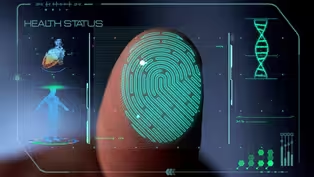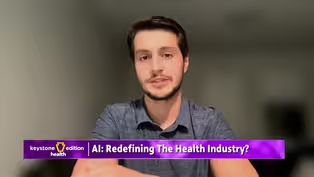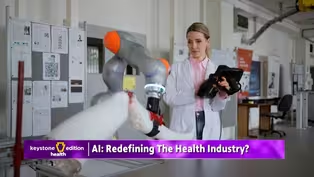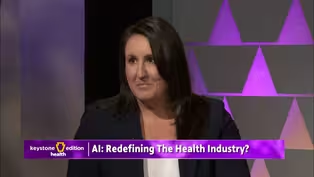Keystone Edition
Advancements in AI and Robotics in Healthcare
Clip: 11/18/2024 | 6m 46sVideo has Closed Captions
In this segment, panelists discuss advancements in AI and robotics in healthcare.
Robotics, guided by 3D CT scans, enhances precision in surgeries, reducing errors to within 0.5 mm and making complex cases safer. AI-generated medical notes improve quality and efficiency, allowing doctors to focus on patients. Future advancements in AI may refine surgical planning, research, and data-driven diagnostics.
Problems playing video? | Closed Captioning Feedback
Problems playing video? | Closed Captioning Feedback
Keystone Edition is a local public television program presented by WVIA
Keystone Edition
Advancements in AI and Robotics in Healthcare
Clip: 11/18/2024 | 6m 46sVideo has Closed Captions
Robotics, guided by 3D CT scans, enhances precision in surgeries, reducing errors to within 0.5 mm and making complex cases safer. AI-generated medical notes improve quality and efficiency, allowing doctors to focus on patients. Future advancements in AI may refine surgical planning, research, and data-driven diagnostics.
Problems playing video? | Closed Captioning Feedback
How to Watch Keystone Edition
Keystone Edition is available to stream on pbs.org and the free PBS App, available on iPhone, Apple TV, Android TV, Android smartphones, Amazon Fire TV, Amazon Fire Tablet, Roku, Samsung Smart TV, and Vizio.
Providing Support for PBS.org
Learn Moreabout PBS online sponsorship- Well, it seems like robotics would probably help with high risk, so to speak as well.
You were just talking about how people's anatomy can be different.
So I would assume that you don't have to cut into a person, open them up, and then see the issue.
Can you talk a little bit about how this can assist with high risk?
- Absolutely, and you know, that's the advantage of robotic surgery is that in order to use it, we do need a CT scan, which is a CAT scan.
It generates a three-dimensional model of your knee, and I'm literally able to put the implant on your knee prior to actually putting the implant on your knee.
So I think it's a huge advantage seeing how things fit, seeing how things can be twisted and tilted to make it balanced correctly, to make sure that everything is in the proper place it should be, without actually having to do any cutting at all.
It gives us an extra piece of armamentarium to make the surgery quicker, safer, and more predictable.
- Joe, you said earlier that the AI notes can sometimes be even better than the physician themselves or the person on Zoom.
Is there someone that's checking these notes and going back to make sure that it has the correct information?
- Absolutely, so like I said, the notes are often quality, and there's a number of reasons for that.
But what we've noticed is the main reason being that the doctor is able to focus more on the patient, and that means the doctor can ask better questions and catch things that they may have missed if they were focused on the note taking.
So, you know, a patient may make an offhand comment, and the doctor normally wouldn't pick up on that.
And yet that offhand comment might have contained something very important.
And so, you know, the notes end up actually being very detailed, but of course it's still a machine and it can still make mistakes.
And so at the end of the day, the doctor is still there to check over and verify that everything is accurate and ask any confirmation questions to the person while they're still there, the patient.
We have found though that the process of verification, it's so much faster than actually writing the note itself, and you end up with the same, if not better quality.
- How do you expect robotics to change?
What sorts of advancements do you see down the pipeline?
- So I think the biggest advancement actually will be with artificial intelligence as we continue to advance our planning.
You know, the robotics is really about the implementation of the plan.
And I think as artificial intelligence gets better, especially at predicting things that we don't see very often, unusual anatomy, I think that's really the exciting part for me, is using that planning phase, almost, you know, in a sense automatically knowing that the success rates will be predicted, you know, based on what we see from that CT scan, and then again using the robot to implement our plan.
- And in terms of... You talked about research before, are you also using AI to help with research per chance?
- I mean, I think it's an evolving field.
I think we obviously have a pretty broad interest in learning and evaluating these tools in a rigorous way.
When we think about the spectrum of AI and the types of toolkits our organization has across the innovation spectrum, whether that's intelligent automation, which is really a part of the AI spectrum, all the way to the generative AI that we're talking about regarding ambient documentation, the goal of all of those types of interventions is really geared toward making better health easy.
And that's better health easy for surgeons, for primary care, for our nurses, for our pharmacists, and for the folks who come in every day to help our organization run.
So when we think about the application of these smart tools, we're trying to grow our toolbox, right, and understand the types of challenges and apply the right intervention at the right time to solve for those.
But I think, the focus really, is about the operationalization of these types of smart tools and the adoption and the engagement, and really focusing on some of those hard outcomes.
So research, evaluation, rigorously taking a look at value metrics associated with the implementation is very focal to us.
- And Joe, how do you foresee things advancing for Dactyl?
Of course, you're pretty new company, you've started with this model.
What do you think you'll do in the future?
- So we've found a number of other orthogonal use cases for technology.
What we've noticed is that, you know, and once they actually have a full transcription of everything and they're working with the generated note, there's a number of other documents that they want to generate.
They may want to generate an invoice to insurance.
They may want to do medical coding, they may want to, as the exam is going on, pull from data from past exams, and get much more accurate diagnoses that way.
And so we've noticed that there is this really big advantage to having a historical look at a patient given all their past exams, their past scans, and then letting a doctor, on the fly, pull information from that.
And so we really see that this retrieval aspect holds a lot of opportunity.
- And let's go back to robotics for a second.
I think that people are thinking that it's probably kind of space age.
Can you talk us a little bit through what a surgery would look like when you're using robotics?
- Absolutely, so the robotics is mostly a robotic arm.
Now, we talked about the pre-op phase where we get the CT scan and we do the three dimensional planning, but the actual saw attaches to a robotic arm, and I guide the arm, right?
So unfortunately, I'm still necessary for a little while, but I do guide the arm based on our plan.
And what that does is keep me within about 1/2 a millimeter of tolerance of where I plan to do the cut.
So we still need to do the exposure, we still need to make sure all structures are safe, but the robot helps us keep stay within the boundaries of where we need to be without injuring any vital structures nearby, so it does make surgery safer.
- So if you're in 1/2 a millimeter now, what was it prior?
- Probably somewhere between 1 to 3.
- Okay.
- Yeah, yeah.
And it really, again, made challenging cases much more accessible to all surgeons.
You know, you didn't have to be in practice 15 years to do a really challenging case.
You can get that technology, use it, and then be able to help more people.
- What's the training like to use this assistive technology?
- To do robotics, so everyone must be certified, right?
So there is a course that all of us use for each individual platform of the robot, whether it's total knee, partial knee, or total hip.
And we have to do that under the supervision of the Mako company basically.
- So a question I have
AI: Redefining the Health Industry? - Preview
Preview: 11/18/2024 | 30s | Watch Monday, November 18th at 7pm on WVIA TV (30s)
The Future of AI in Healthcare
Video has Closed Captions
Clip: 11/18/2024 | 8m 31s | Future advancements aim to integrate AI further into healthcare, (8m 31s)
Overview - AI: Redefining the Health Industry
Clip: 11/18/2024 | 59s | AI is improving diagnostic accuracy, personalizing treatments, and enhancing operational efficiency. (59s)
Practical Applications for AI in Healthcare
Clip: 11/18/2024 | 8m 29s | A discussion of AI and Robotics in healthcare (8m 29s)
Providing Support for PBS.org
Learn Moreabout PBS online sponsorship
- News and Public Affairs

Top journalists deliver compelling original analysis of the hour's headlines.

- News and Public Affairs

FRONTLINE is investigative journalism that questions, explains and changes our world.












Support for PBS provided by:
Keystone Edition is a local public television program presented by WVIA



